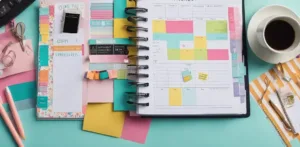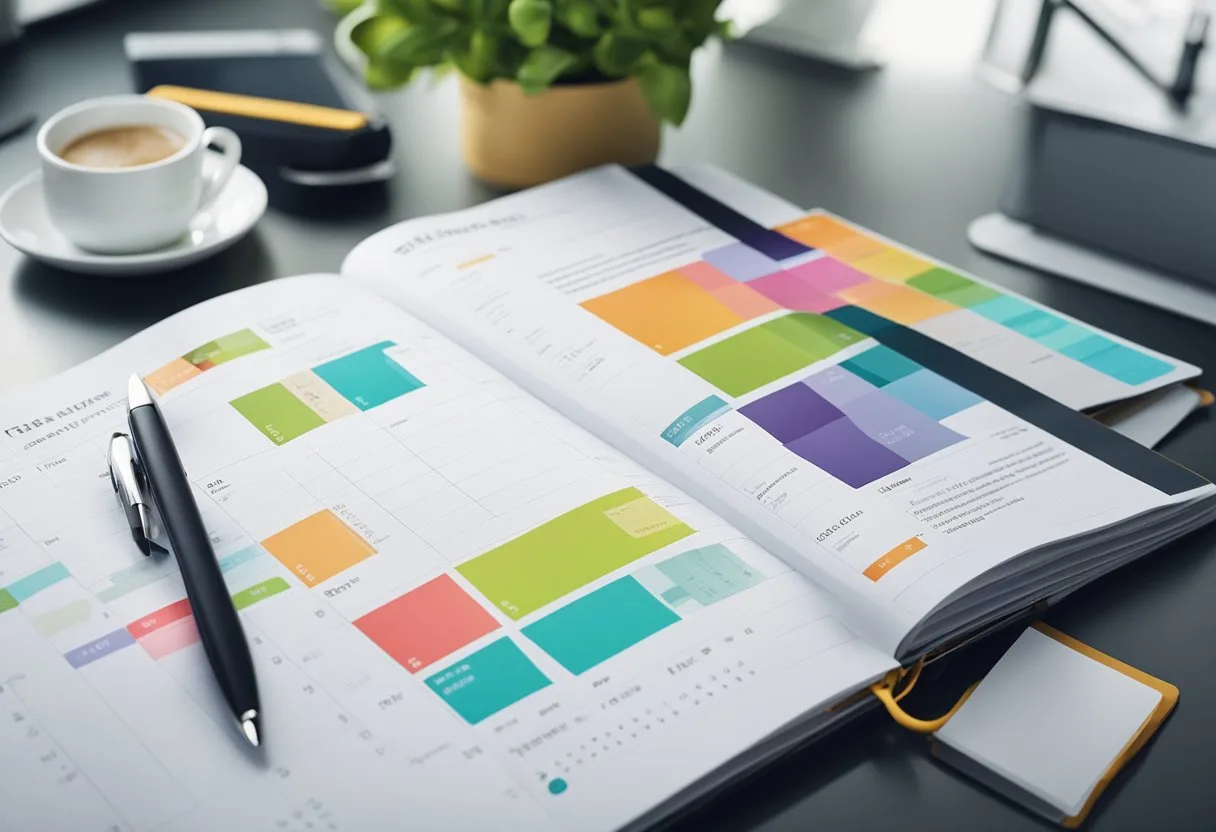Stress Management is a popular topic among individuals who are looking to reduce stress and improve their overall well-being. Happy Planner offers a variety of planners and layouts designed to help individuals manage their stress levels, prioritize self-care, and achieve their goals. These planners are designed to be customizable and can be tailored to fit the unique needs of each individual. In this blog post, I will walk you through the process of using your happy planner for stress management and share with you 20 ideas to help you get started.
One of the key features of Happy Planner Stress Management layouts is the inclusion of exercises and habits that support mindfulness in self-care routines. Monthly check-in pages offer specific objectives, actions, and tips to help individuals achieve their goals and manage their stress levels.
The Role of Happy Planner in Stress Management
Happy Planner is a popular tool that can help individuals manage stress effectively. It is a planner that is designed to help people stay organized, focused, and motivated. The Happy Planner provides a structured approach to managing tasks and responsibilities, which can help to reduce stress levels. By using the Happy Planner, individuals can prioritize tasks, set goals, and track progress. This can help to reduce feelings of overwhelm and increase feelings of accomplishment.
Key Concepts in Stress Management
Stress management is the process of identifying and managing the sources of stress in one’s life. It involves developing coping skills and strategies to deal with stress effectively. One of the key concepts in stress management is mindfulness.
Mindfulness is the practice of being present in the moment and paying attention to one’s thoughts, feelings, and sensations without judgment. It can help individuals to become more aware of their stress triggers and to develop strategies to manage them.
Another key concept in stress management is the development of coping skills. Coping skills are strategies that individuals can use to deal with stress effectively. Coping skills can include activities such as exercise, meditation, and deep breathing.
The Happy Planner can be a valuable tool in stress management because it helps individuals to develop mindfulness and coping skills. The planner provides a structured approach to managing tasks and responsibilities, which can reduce feelings of overwhelm. It also includes sections for reflection and goal-setting, which can help individuals to become more aware of their stress triggers and to develop strategies to manage them.
How to use happy planner for stress management

To use a Happy Planner for stress management, follow these steps:
- Select the Right Layout: Choose a Happy Planner with sections that cater to stress management and wellness.
- Personalize Your Planner: Make it your own with stickers, colors, and accessories that soothe you.
- Set Monthly Goals: At the start of each month, set goals focused on reducing stress.
- Track Your Moods: Use the mood tracker to note your daily emotional state and patterns.
- Schedule Relaxation: Block out time for relaxation and self-care activities.
- Plan Healthy Habits: Incorporate exercise, healthy eating, and sleep schedules into your planner.
- Reflect Daily: Use the space for daily reflection to jot down thoughts and decompress.
- Identify Stressors: Keep a log of stress triggers to find patterns and solutions.
- Practice Gratitude: Dedicate a section to list things you’re grateful for each day or week.
- Monitor Progress: Regularly review your goals and progress towards stress reduction.
Happy planner stress management ideas
Here are 20 Happy Planner stress management ideas:
- Create a weekly self-care checklist.
- List relaxation techniques and track which ones you use.
- Use habit trackers for meditation or deep breathing exercises.
- Schedule regular digital detox days.
- Plan and track your exercise routines.
- Keep a sleep log to ensure you’re getting enough rest.
- Dedicate a section to write down positive affirmations.
- Use stickers to quickly identify stress-free days.
- Incorporate a section for journaling about your feelings.
- Create a list of activities that make you happy and schedule them in.
- Track your water intake to stay hydrated.
- Plan healthy meal prep and snacks.
- Use the notes section for brainstorming solutions to stressors.
- Decorate with calming colors and images.
- Add inspirational quotes to boost your mood.
- Keep a list of contacts for friends or professionals you can talk to when stressed.
- Schedule regular breaks throughout your day.
- Plan outings or events that you can look forward to.
- Track your personal growth and milestones.
- Use the monthly view to get a big picture of your stress management journey.
Setting Up Your Happy Planner

When it comes to setting up your Happy Planner, there are a few things to keep in mind to make the most of its customizable disc-bound system. Here are some tips on how to get started:
Choosing the Right Happy Planner
First and foremost, it’s important to choose the right Happy Planner for your needs. There are a variety of sizes and layouts available, ranging from mini to classic to big, and from horizontal to vertical to dashboard.
Consider how you plan to use your planner and what type of layout would work best for you. Happy Planners come with laminated covers and plastic discs, making them durable and long-lasting.
Customizing Your Planner Layout
Once you’ve chosen your Happy Planner, it’s time to start customizing its layout to fit your needs. Happy Planners come dated, so you can start using it right away. However, you can also add in your own pages, dividers, and stickers to make it truly unique. Consider adding in sections for goal-setting, habit-tracking, and gratitude journaling to help manage stress and promote positivity.
Organizing Monthly, Weekly, and Daily Sections
Finally, it’s important to organize your Happy Planner’s monthly, weekly, and daily sections to keep everything in order. Use the monthly section to plan out larger events and goals, the weekly section to break down tasks and appointments, and the daily section to track your daily to-do list and habits. By breaking down your schedule into manageable chunks, you can reduce stress and stay on top of your tasks.
Incorporating Stress-Relief Techniques

When it comes to managing stress, incorporating stress-relief techniques can be an effective way to promote wellness. The Happy Planner Stress Management Planner Layout offers a variety of tools and resources to help individuals combat stress and develop healthy habits.
Journaling Prompts and Exercises
Journaling can be a powerful tool for managing stress. By taking the time to reflect on thoughts and emotions, individuals can gain insight into their stress triggers and develop coping strategies. The Happy Planner Stress Management Planner Layout includes journaling prompts and exercises to help individuals identify and manage stress. Some suggested exercises include writing down three things you are grateful for, reflecting on a positive experience from the day, or writing a letter to yourself.
Mindfulness and Habit Tracking
Mindfulness and habit tracking can be effective ways to manage stress and promote wellness. The Happy Planner Stress Management Planner Layout includes mindfulness exercises and habit tracking tools to help individuals stay on track with their wellness goals. Some suggested exercises include guided meditations, deep breathing exercises, or progressive muscle relaxation.
Self-Care and Wellness Activities
Self-care and wellness activities can be essential for managing stress and promoting overall wellness. The Happy Planner Stress Management Planner Layout includes tools and resources to help individuals prioritize self-care and wellness. Some suggested activities include taking a relaxing bath, practicing yoga or stretching, or going for a walk in nature.
Through incorporating stress-relief techniques such as journaling, mindfulness, and self-care activities into their daily routine, individuals can effectively manage stress and promote wellness. The Happy Planner Stress Management Planner Layout offers a variety of resources and tools to help individuals develop healthy habits and manage stress.
Enhancing Your Planner Experience

Utilizing Accessories and Add-ons
To enhance your Happy Planner experience, you can use various accessories and add-ons that are available. These include stickers, snap-in accessories, washi tape, dividers, and other planner accessories. These items can help you personalize your planner and make it more functional.
Stickers are a great way to add some color and personality to your planner. You can use them to mark important dates, events, or tasks. Snap-in accessories, such as bookmarks, pockets, and dashboards, can help you keep track of important information and make it easily accessible.
Washi tape is a decorative tape that can be used to add some flair to your pages. You can use it to create borders, highlight important information, or just add some color to your planner. Dividers can help you organize your planner into sections, making it easier to find what you need.
Engaging with Monthly Check-Ins and Notes
The Happy Planner stress management layout includes monthly check-ins and notes sections. These are designed to help you track your progress and reflect on your goals. You can use the monthly check-ins to evaluate how your self-care routine is going and make adjustments as needed.
The notes section can be used to jot down ideas, thoughts, or anything else that comes to mind. This can be a great way to clear your mind and reduce stress. You can also use the notes section to set reminders or make to-do lists.
By utilizing these features, you can make the most out of your Happy Planner stress management layout. With the help of accessories and add-ons, you can personalize your planner and make it more functional. Engaging with monthly check-ins and notes can help you track your progress and reduce stress.
Planning for Specific Goals
When it comes to managing stress, it can be helpful to set specific goals and plan accordingly. The Happy Planner offers a variety of layouts and tools to help individuals plan for specific goals related to fitness, meal planning, projects, everyday life, daily reminders, recovery, and stress less strategies.
Fitness and Meal Planning
For those looking to prioritize their health and wellness, The Happy Planner offers fitness and meal planning layouts. These layouts provide space to plan out workouts and meals for the week, making it easier to stay on track and achieve fitness and nutrition goals. The use of fun stickers and colorful layouts can make the planning process more enjoyable and motivating.
Project Management and Everyday Tasks
For individuals looking to manage projects or tackle everyday tasks, The Happy Planner offers layouts specifically designed for project management and daily planning. These layouts provide space to break down larger tasks into smaller, more manageable steps and track progress along the way. The use of checklists and color coding can also help increase productivity and reduce stress.
Recovery and Stress Less Strategies
For those looking to prioritize self-care and stress management, The Happy Planner offers layouts specifically designed for recovery and stress less strategies. These layouts provide space to plan out self-care activities and track progress towards stress management goals. The use of inspirational quotes and calming colors can also help promote relaxation and reduce stress.
The Happy Planner provides a variety of layouts and tools to help individuals plan for specific goals related to fitness, meal planning, projects, everyday life, daily reminders, recovery, and stress less strategies. By setting specific goals and planning accordingly, individuals can reduce stress and improve overall well-being.
Frequently Asked Questions
How can a Happy Planner improve daily stress management?
A Happy Planner can help improve daily stress management by providing a structured way to plan and organize tasks and activities. By using a planner, individuals can prioritize tasks, set achievable goals, and track their progress. This can help reduce feelings of overwhelm and increase feelings of control and accomplishment.
What features of the Happy Planner are specifically designed for wellness tracking?
The Happy Planner offers several features that are specifically designed for wellness tracking, including mood trackers, habit trackers, and self-care check-ins. These features can help individuals track their progress towards wellness goals, identify patterns in their behavior, and make adjustments as needed.
Can the Happy Planner Calm Life edition help in achieving a more peaceful lifestyle?
Yes, the Happy Planner Calm Life edition can help individuals achieve a more peaceful lifestyle by providing a stress management layout that includes prompts for self-reflection, mindfulness exercises, and coping strategies. By using this layout, individuals can develop a greater awareness of their stress triggers and learn effective ways to manage stress.
Are there templates available for stress management in the Happy Planner?
Yes, there are several templates available for stress management in the Happy Planner, including the Calm Life and Stress Management layouts. These layouts offer prompts and exercises to help individuals manage stress and develop healthy coping strategies.
How does the Happy Planner Wellness Layout support mental health?
The Happy Planner Wellness Layout supports mental health by providing prompts and exercises that encourage self-reflection, mindfulness, and self-care. By using this layout, individuals can develop a greater awareness of their mental health needs and learn effective ways to support their well-being.
What are the benefits of using the Happy Planner Heal From Within edition for stress reduction?
The Happy Planner Heal From Within edition offers benefits for stress reduction by providing a layout that focuses on self-care and healing. This layout includes prompts for gratitude, self-love, and positive affirmations, which can help individuals cultivate a more positive mindset and reduce feelings of stress and anxiety.




